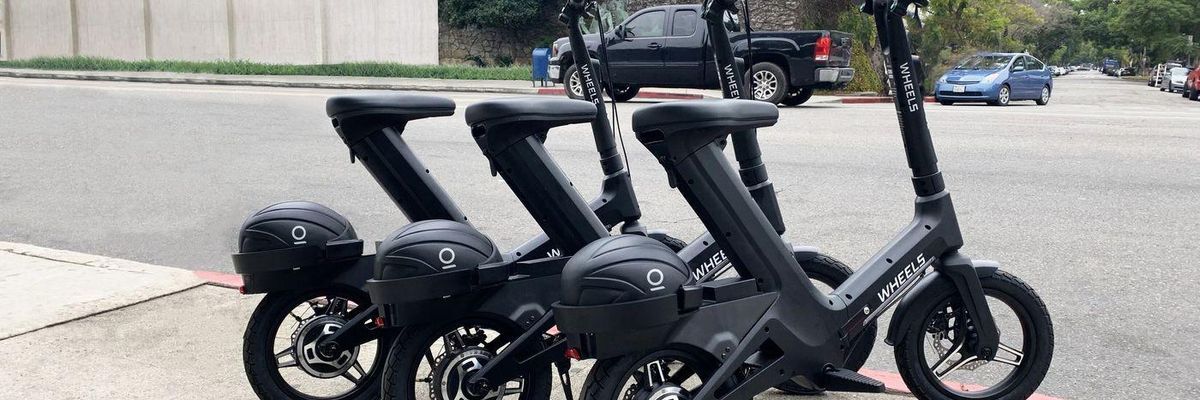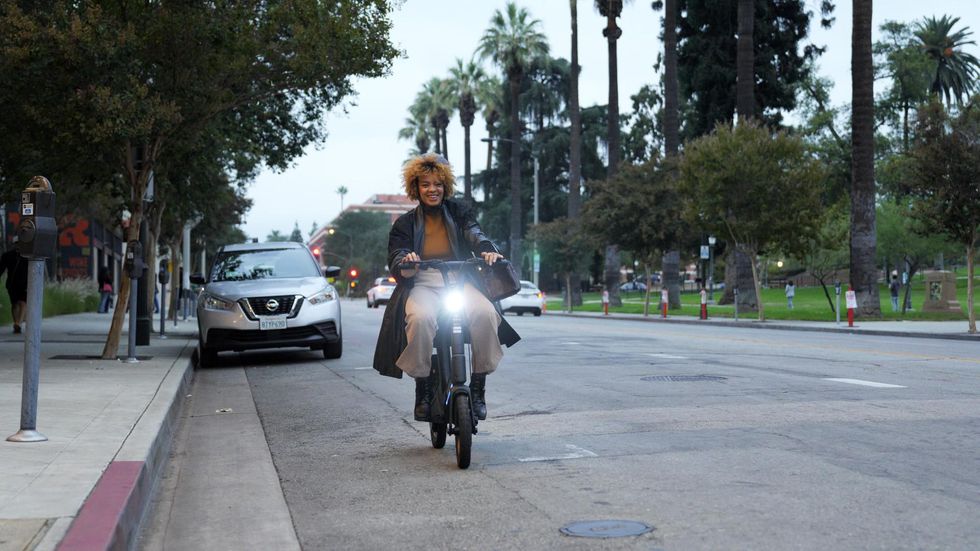

Get in the KNOW
on LA Startups & Tech
X
Image courtesy of Wheels
Can WeHo-Based Wheels Get More Underserved Angelenos to Ride E-Bikes?
Maylin Tu
Maylin Tu is a freelance writer who lives in L.A. She writes about scooters, bikes and micro-mobility. Find her hovering by the cheese at your next local tech mixer.
When Los Angeles launched its micromobility pilot in 2019, it had big dreams for improving transportation equity for all Angelenos.
Three years later, less than 3,000 people make use of micromobility programs aimed at helping poorer sections of the city, despite stringent requirements on companies to provide these options and programs to help raise awareness. At issue, experts said, is a patchwork of rules and regulations between municipalities that can be a logistical headache for riders, infrastructure that doesn’t offer much protection for scooter and bike riders in these areas and a public outreach campaign that has failed to gain traction.
“It's a big challenge because when you drive your car, for example, people don't pay attention to municipal boundaries. They just want to get from point A to point B in the most seamless way possible,” said Will Sowers, director of public affairs at Wheels.

Wheels Director of Public Affairs Will Sowers.
Image courtesy of Wheels
While each city has its own equity requirements, the city of L.A. established its current program in 2021. Any operator deploying vehicles in special operation zones (including Venice, Hollywood and Downtown) is required to deploy 20% of its fleet in equity zones. There is no trip fee for rides that begin or end in these zones. The city also requires operators to offer a low-income option for riders, attend meetings with neighborhood councils and other local stakeholders, provide a non-credit-card and non-smartphone option for payment and partner with a community-based organization.
But those efforts haven't made as much an impact as the city might have hoped.
As of October 2021 there were 2,915 active users enrolled in low-income programs across all operators, according to information provided by L.A.’s Department of Transportation. That’s just 17 more riders than the city reported a year and a half earlier–in a report which also noted that 85% of users did not know that equity programs were available.
Riders in L.A.’s underserved neighborhoods use micromobility differently than those in more affluent areas, according to Sowers. While a rider in Venice might ride to the beach or to a restaurant, riders in underserved areas often use e-scooters as a way to get from a transit stop to work and vice versa.
“We've even seen examples of people using our device as a courier,” he added, “where they may — with one of many delivery apps — grab a short shift.”
Wheels Plan to Go Further
Wheels is trying something different. The company has made an effort to design its scooter for the way that lower-income riders use them, and is one of the few scooter companies able to thread the requirements of multiple municipalities in L.A.
It currently boasts it has the most interconnected micromobilty network in the L.A. metro region, with permits to operate in the city of L.A., Santa Monica, Culver City and West Hollywood, as well as plans to launch in Glendale.
Practically speaking, that means a user could ride a Wheels device between municipalities to get to work or school without worrying about landing in a no-parking zone (Beverly Hills, for instance, is geofenced and off-limits for scooter riding and parking).
Wheels was founded in 2018 in West Hollywood by Jonathan and Joshua Viner, who previously co-founded pet-walking startup Wag. The company’s scooters are designed for traveling longer distances. While a typical standup scooter goes one mile per ride, a Wheels seated mini-bike goes about one and a half miles. Along with its app-based service, the company also offers monthly rentals.
So far, the company has raised $96.3M in funding..
As part of its “Wheels for All” program, riders in all four municipalities who use state or federal benefits can ride at a steep discount. Currently, Wheels devices are $1.10 to unlock and then $0.39 per minute to ride. But underserved riders get unlimited rides of 30 minutes or less, paying only the unlocking fee.
The program is also more expansive than L.A. requires. In addition to low-income riders, people with disabilities and older adults who the city designates as “underserved populations,” Wheels program is also available for unhoused people.
To qualify, applicants fill out a form online and provide proof of enrollment in a state or federal program.
In comparison, its competitor Lime offers rides for $0.50 to unlock plus $0.07 per minute plus tax through its Lime Access program; Bird offers 50% off rides for low-income Angelenos through its Community Pricing program.
Although Wheels has the most interconnected equity program, enrollment is low. Only about 1,000 riders are signed up across the greater L.A. area. The program has provided just over 23,000 rides in the last year.
Sowers said this is an issue his company is doing its best to address. He added that he frequently talks to social service workers and organizations to help spread the word. Many, he said, are initially skeptical of recommending micromobility options to their clients.
One such person called him after seeing someone with a disability riding a Wheels device:
“They called me and were like, ‘That makes sense to me. It makes sense that someone can sit down and potentially have an accessibility challenge, but still be able to ride your device’.”
Berkeley professor and co-director of the Transportation Sustainability Research Center Dr. Susan A. Shaheen told dot.LA over email that Wheels’ approach to equity has potential.
“It could provide a more affordable alternative to private vehicle use, particularly during these times of high gas prices,” she said.

No Equity Without Infrastructure
Another challenge that Wheels, like its competitors, deals with is infrastructure. California law bans e-scooters from operating on sidewalks. But not everyone is comfortable riding an e-scooter or e-bike in the street, especially where there are no bike lanes and little infrastructure to keep riders safe. That’s especially true in many low-income neighborhoods.
“If you want to prioritize equity, you need to build infrastructure for micromobility in the places that are the most dangerous to use micromobility, which is in the least-invested communities,” said Michael Schneider, founder of advocacy group Streets For All. He added that providing equity means building interconnected cycling infrastructure throughout the city, especially along L.A.’s high injury network.
The city has said it's trying to address the disparity.
Los Angeles has brought in $4 million over two fiscal years through its micromobility permit program, according to the city’s Department of Transportation. It’s using some of that money to fund a redesign of the 7th Street corridor, including protected bike lanes, after data showed that this segment of Downtown was one of the busiest for e-scooters and e-bikes, Public Information Director Colin Sweeney said via email.
In the future, Sowers sees the potential for L.A. to use that funding, along with the data it collects from operators, to build better infrastructure in underserved areas.
“If someone in a transit desert is riding one of our devices, and I give the city good data and say, ‘Hey, I've got tons of rides in this neighborhood, but there's no protected bike lanes,’ then that creates a reason for the city to build that.”
From Your Site Articles
- Bird CEO: Gas Prices Could Boost E-Scooter, E-Bike Ridership - dot ... ›
- LINK Will Add Another 1500 E-Scooters to LA Streets - dot.LA ›
- Veo CEO Is Bringing Anti-Tech Bro Approach to Micromobility - dot.LA ›
- Move Slow and Fix Things: E-Scooter Startup Superpedestrian ›
- Lime Is Bringing Its New, More Eco-Friendly Scooters to LA - dot.LA ›
- E-Scooter Companies Quietly Change Low-Income Programs in LA - dot.LA ›
- Wheels Agrees To Sell Business to Micromobility Firm Helbiz - dot.LA ›
- Wheels Agrees To Sell Business to Micromobility Firm Helbiz - dot.LA ›
- Wheels Agrees To Sell Business to Micromobility Firm Helbiz - dot.LA ›
Related Articles Around the Web
Maylin Tu
Maylin Tu is a freelance writer who lives in L.A. She writes about scooters, bikes and micro-mobility. Find her hovering by the cheese at your next local tech mixer.
Rain's Latest Funding Fuels the Future of Financial Wellness
09:21 AM | April 11, 2025
🔦 Spotlight
Happy Friday,
This week, the LA tech scene buzzed with news that Rain, a leader in financial wellness, hassecured $75 million in Series B equity funding, spearheaded by Prosus. This isn't just another funding round; it's a pivotal chapter in Rain's mission to transform how American workers interact with their earnings.
Since its inception, Rain has been at the forefront of innovation in financial technology, particularly with its earned wage access solutions. The concept was simple yet revolutionary: allow workers to access their earned wages instantly, mitigating financial stress and dependency on high-interest payday loans. This vision quickly gained traction, propelling Rain from a promising startup to a key player in the fintech space.
What makes this Series B funding particularly noteworthy is what it represents on a larger scale. It's not just an influx of capital but a strong endorsement of Rain's potential to expand even further. With previous rounds fueling their initial growth and strategic partnerships, such as their notablecollaboration with Marqeta to enhance payment technologies, Rain has steadily built a foundation not just for success but for significant impact.
As Rain secures this significant new funding, their initiative to reshape financial wellness is set to expand dramatically, showcasing the profound impact tech can have on everyday financial challenges.
Looking forward to seeing how their innovations will drive change in the financial landscape.
🤝 Venture Deals
LA Companies
- Dosen, a Los Angeles-based HRtech startup founded by Ronan Wall, Victor Burke, and Cian McCarthy, has secured $2.3M in an oversubscribed pre-seed funding round led by Affinity Ventures. The company offers an AI-powered platform that aligns employee-led learning with business goals through personalized, gamified development programs. The funds will be used to scale the platform, enhance AI-driven personalized learning, and improve employee engagement and productivity. - learn more
- Plug, a Santa Monica-based company operating an EV-exclusive wholesale online auction platform, has secured $6.7M in an oversubscribed seed funding round led by Floodgate, Autotech Ventures, and A*. The company has also launched Plug Trade Desk™, the first EV-focused service designed to help dealers confidently price, move, and monetize trade-ins. The newly acquired funds will be used to enhance Plug's technology and expand its services, aiming to support dealers in navigating the growing used EV market. - learn more
- Gallatin AI, a defense tech startup, has raised $15M in seed funding led by 8VC to scale its AI-powered logistics platform, Navigator. The tool helps military logisticians predict, plan, and execute operations more efficiently in contested environments. Funds will be used to expand the team and deploy the platform across military services. - learn more
- BLNG AI, a generative AI platform based in Los Angeles and Paris, raised $3M in seed funding led by Speedinvest to streamline jewelry design by turning sketches into photorealistic renderings and animations. The funding will support commercialization, team expansion in Europe and the U.S., and the launch of a subscription-based app for luxury brands and independent jewelers. - learn more
- Amca, a newly launched aerospace company focused on modernizing the industrial supply chain, has raised $76M in funding from investors including Caffeinated Capital, Founders Fund, Lux Capital, Andreessen Horowitz, and others. The company plans to acquire specialized suppliers and develop new aerospace products, aiming to strengthen and future-proof the sector’s manufacturing and innovation capabilities. - learn more
- Turbine Finance Corp., a Santa Monica, California-based data science-driven liquidity platform, has raised a total of $21.75M in equity funding, comprising a $13M Series A round co-led by Alpha Edison and TTV Capital, and a previously unannounced $8.75M seed round with participation from Fin Capital, B Capital, and Sozo Ventures. Additionally, the company secured up to a $100M warehouse facility from Silicon Valley Bank to provide credit facilities to venture investors. The combined funding of $121.75M will be used to deploy the warehouse line and expand Turbine's data science team. Turbine's platform enables private equity and venture firms to offer limited partners access to the value of their portfolio investments without reducing exposure, leveraging machine learning to expedite underwriting processes. - learn more
- Gente Beauty, an innovative Brazilian body care brand, has received a lead investment from Webster Capital, a private equity firm specializing in consumer and healthcare sectors. This partnership aims to support Gente Beauty's growth and expansion in the beauty industry. - learn more
LA Venture Funds
- Alexandria Investment Partners participated in a $41M Series A round for Solu Therapeutics, a Boston-based biotech company developing targeted protein degradation therapies. The funding will advance its lead candidate, STX-0712, which recently entered a Phase 1 clinical trial for CMML and other advanced blood cancers. - learn more
- Calibrate Ventures participated in SigIQ.ai's $9.5M seed funding round. SigIQ.ai, based in Berkeley, California, is an AI tutoring startup focused on providing personalized education through advanced AI models. The funds will be used to hire top talent, enhance their AI models, and scale their platforms to educational systems worldwide. - learn more
- Rusheen Capital Management participated in Zero Industrial's $10M Series A funding round, aiming to accelerate the development of thermal energy storage solutions in North America. Zero Industrial focuses on deploying large-scale thermal energy storage projects to enhance energy efficiency and support decarbonization efforts. The funding will be used to expand their project pipeline and advance the commercialization of their technology. - learn more
LA Exits
- Bread Beauty Supply has been acquired by Cost of Doing Business (CODB), a holding company founded in 2024 by Topicals founder and CEO Olamide Olowe and president Sochi Mbadugha. The acquisition aims to expand Bread's retail presence in the U.S., starting with an increased footprint in Sephora stores. Founder Maeva Heim will continue as Chief Creative Officer, focusing on the brand's creative direction, while CODB will manage strategic operations. This move reflects CODB's commitment to supporting Black-owned businesses and fostering diversity in the beauty industry. - learn more
Read moreShow less
Here's How To Get a Digital License Plate In California
03:49 PM | October 14, 2022
Photo by Clayton Cardinalli on Unsplash
Thanks to a new bill passed on October 5, California drivers now have the choice to chuck their traditional metal license plates and replace them with digital ones.
The plates are referred to as “Rplate” and were developed by Sacramento-based Reviver. A news release on Reviver’s website that accompanied the bill’s passage states that there are “two device options enabling vehicle owners to connect their vehicle with a suite of services including in-app registration renewal, visual personalization, vehicle location services and security features such as easily reporting a vehicle as stolen.”
Reviver Auto Current and Future CapabilitiesFrom Youtube
There are wired (connected to and powered by a vehicle’s electrical system) and battery-powered options, and drivers can choose to pay for their plates monthly or annually. Four-year agreements for battery-powered plates begin at $19.95 a month or $215.40 yearly. Commercial vehicles will pay $275.40 each year for wired plates. A two-year agreement for wired plates costs $24.95 per month. Drivers can choose to install their plates, but on its website, Reviver offers professional installation for $150.
A pilot digital plate program was launched in 2018, and according to the Los Angeles Times, there were 175,000 participants. The new bill ensures all 27 million California drivers can elect to get a digital plate of their own.
California is the third state after Arizona and Michigan to offer digital plates to all drivers, while Texas currently only provides the digital option for commercial vehicles. In July 2022, Deseret News reported that Colorado might also offer the option. They have several advantages over the classic metal plates as well—as the L.A. Times notes, digital plates will streamline registration renewals and reduce time spent at the DMV. They also have light and dark modes, according to Reviver’s website. Thanks to an accompanying app, they act as additional vehicle security, alerting drivers to unexpected vehicle movements and providing a method to report stolen vehicles.
As part of the new digital plate program, Reviver touts its products’ connectivity, stating that in addition to Bluetooth capabilities, digital plates have “national 5G network connectivity and stability.” But don’t worry—the same plates purportedly protect owner privacy with cloud support and encrypted software updates.
5 Reasons to avoid the digital license plate | Ride TechFrom Youtube
After the Rplate pilot program was announced four years ago, some raised questions about just how good an idea digital plates might be. Reviver and others who support switching to digital emphasize personalization, efficient DMV operations and connectivity. However, a 2018 post published by Sophos’s Naked Security blog pointed out that “the plates could be as susceptible to hacking as other wireless and IoT technologies,” noting that everyday “objects – things like kettles, TVs, and baby monitors – are getting connected to the internet with elementary security flaws still in place.”
To that end, a May 2018 syndicated New York Times news service article about digital plates quoted the Electronic Frontier Foundation (EFF), which warned that such a device could be a “‘honeypot of data,’ recording the drivers’ trips to the grocery store, or to a protest, or to an abortion clinic.”
For now, Rplates are another option in addition to old-fashioned metal, and many are likely to opt out due to cost alone. If you decide to go the digital route, however, it helps if you know what you could be getting yourself into.
From Your Site Articles
- 8 Alternatives to Uber and Lyft in California - dot.LA ›
- Automotus Will Monitor Santa Monica's New Drop-Off Zone - dot.LA ›
- Metropolis CEO Alex Israel on Parking's Future - dot.LA ›
Related Articles Around the Web
Read moreShow less
Steve Huff
Steve Huff is an Editor and Reporter at dot.LA. Steve was previously managing editor for The Metaverse Post and before that deputy digital editor for Maxim magazine. He has written for Inside Hook, Observer and New York Mag. Steve is the author of two official tie-ins books for AMC’s hit “Breaking Bad” prequel, “Better Call Saul.” He’s also a classically-trained tenor and has performed with opera companies and orchestras all over the Eastern U.S. He lives in the greater Boston metro area with his wife, educator Dr. Dana Huff.
steve@dot.la
RELATEDTRENDING
LA TECH JOBS


